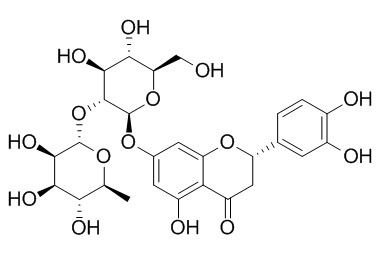Neoeriocitrin
Neoeriocitrin has antioxidant capacity, it could rescue the inhibition effect of cell differentiation induced by PD98059 to some degree.Neoeriocitrin may be a new promising candidate drug for treatment of osteoporosis.
Inquire / Order:
manager@chemfaces.com
Technical Inquiries:
service@chemfaces.com
Tel:
+86-27-84237783
Fax:
+86-27-84254680
Address:
1 Building, No. 83, CheCheng Rd., Wuhan Economic and Technological Development Zone, Wuhan, Hubei 430056, PRC
Providing storage is as stated on the product vial and the vial is kept tightly sealed, the product can be stored for up to
24 months(2-8C).
Wherever possible, you should prepare and use solutions on the same day. However, if you need to make up stock solutions in advance, we recommend that you store the solution as aliquots in tightly sealed vials at -20C. Generally, these will be useable for up to two weeks. Before use, and prior to opening the vial we recommend that you allow your product to equilibrate to room temperature for at least 1 hour.
Need more advice on solubility, usage and handling? Please email to: service@chemfaces.com
The packaging of the product may have turned upside down during transportation, resulting in the natural compounds adhering to the neck or cap of the vial. take the vial out of its packaging and gently shake to let the compounds fall to the bottom of the vial. for liquid products, centrifuge at 200-500 RPM to gather the liquid at the bottom of the vial. try to avoid loss or contamination during handling.
Comp. & Mathematical Methods in Med.2022, 5475559.
Drug Test Anal.2018, 10(10):1579-1589
Pharmacognosy Journal.2020, 12(2), p232-235.
Int J Mol Sci.2021, 22(14):7324.
Vietnam J. Chemistry2022, 60(2):211-222
Cancers (Basel).2023, 15(1):293.
Antiviral Res.2021, 193:105142.
Front Pharmacol.2018, 9:236
LWT2024, v208:116677
Mol Biol Rep.2023, 50(5):4029-4038.
Related and Featured Products
Phytomedicine. 2011 Aug 15;18(11):985-9.
Comparison of neoeriocitrin and naringin on proliferation and osteogenic differentiation in MC3T3-E1.[Pubmed:
21741227]
Naringin is considered the main effective compound of Drynaria Rhizome, which is used commonly in the treatment of osteoporosis in traditional Chinese medicine. However, we found Neoeriocitrin, a new compound isolated from Drynaria Rhizome, showed a better activity than naringin on proliferation and osteogenic differentiation in MC3T3-E1.
METHODS AND RESULTS:
Both Neoeriocitrin and naringin exhibited the best effect on proliferation and osteogenic differentiation at concentration of 2μg/ml. Neoeriocitrin more significantly improved proliferation and alkaline phosphatase (ALP) activity as well as up-regulated Runx2, COLI and OCN expression by 56%, 37% and 14% respectively than naringin. Furthermore, Neoeriocitrin could rescue the inhibition effect of cell differentiation induced by PD98059 to some degree.
CONCLUSIONS:
Therefore, Neoeriocitrin may be a new promising candidate drug for treatment of osteoporosis.
J Agric Food Chem. 2005 Mar 23;53(6):2009-14.
Antioxidant activity of citrus limonoids, flavonoids, and coumarins.[Pubmed:
15769128 ]
METHODS AND RESULTS:
A variety of in vitro models such as beta-carotene-linoleic acid, 1,1-diphenyl-2-picryl hydrazyl (DPPH), superoxide, and hamster low-density lipoprotein (LDL) were used to measure the antioxidant activity of 11 citrus bioactive compounds. The compounds tested included two limonoids, limonin (Lim) and limonin 17-beta-D-glucopyranoside (LG); eight flavonoids, apigenin (Api), scutellarein (Scu), kaempferol (Kae), rutin trihydrate (Rut), neohesperidin (Neh), Neoeriocitrin (Nee), naringenin (Ngn), and naringin(Ng); and a coumarin (bergapten). The above compounds were tested at concentration of 10 microM in all four methods. It was found that Lim, LG, and Ber inhibited <7%, whereas Scu, Kae, and Rut inhibited 51.3%, 47.0%, and 44.4%, respectively, using the beta-carotene-linoleate model system. Lim, LG, Rut, Scu, Nee, and Kae showed 0.5% 0.25%, 32.2%, 18.3%, 17.2%, and 12.2%, respectively, free radical scavenging activity using the DPPH method. In the superoxide model, Lim, LG, and Ber inhibited the production of superoxide radicals by 2.5-10%, while the flavonoids such as Rut, Scu, Nee, and Neh inhibited superoxide formation by 64.1%, 52.1%, 48.3%, and 37.7%, respectively. However, LG did not inhibit LDL oxidation in the hamster LDL model. But, Lim and Ber offered some protection against LDL oxidation, increasing lag time to 345 min (3-fold) and 160 min (33% increase), respectively, while both Rut and Nee increased lag time to 2800 min (23-fold). Scu and Kae increased lag time to 2140 min (18-fold) and 1879 min (15.7-fold), respectively. In general, it seems that flavonoids, which contain a chromanol ring system, had stronger antioxidant activity as compared to limonoids and bergapten, which lack the hydroxy groups.
CONCLUSIONS:
The present study confirmed that several structural features were linked to the strong antioxidant activity of flavonoids. This is the first report on the antioxidant activity of limonin, limonin glucoside, and Neoeriocitrin.
J Sep Sci . 2020 Apr;43(8):1531-1543.
Extraction and isolation of acetylcholinesterase inhibitors from Citrus limon peel using an in vitro method[Pubmed:
31999045]
Abstract
A simple and efficient ultrafiltration-liquid chromatography-mass spectrometry-based method was developed for the rapid screening and identification of ligands from Citrus limon peel, which are suitable acetylcholinesterase inhibitors. Subsequently, the anti-Alzheimer's activity of these compounds was assessed using a PC12 cell model. Six major compounds, viz. Neoeriocitrin, isonaringin, naringin, hesperidin, neohesperidin, and limonin, were identified as potent acetylcholinesterase inhibitors. A continuous and efficient online method, which involved the use of a microwave-assisted extraction device, solvent concentration tank, and centrifugal partition chromatography column, was developed for the scale-up of these compounds, and the obtained compounds presented high purity. Next, their bioactivity was evaluated using a PC12 cell model. This novel approach, which was based on ultrafiltration-liquid chromatography-mass spectrometry, microwave-assisted extraction online coupled with solvent concentration tank, and centrifugal partition chromatography along with in vitro evaluation, could represent a powerful tool for the screening and extraction of acetylcholinesterase inhibitors from complex matrices, and could be a useful platform for the large-scale production of bioactive and nutraceutical ingredients.
Keywords: Alzheimer's disease; acetylcholinesterase inhibitors; centrifugal partition chromatography; citrus limon.



